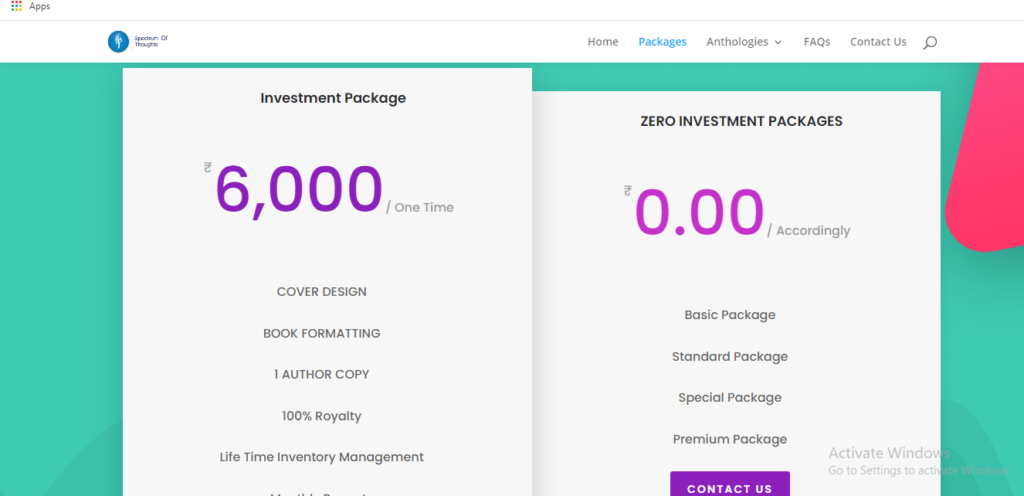The Indian book market is currently the sixth largest in the world and is worth Rs 739 Billion. India has recently witnessed the rise of self-published books which can be released into the market within days or a few weeks from the time of submission of the manuscripts as opposed to traditional publishing which can take up to 5 years. Amongst these self-publishing books lies a rising industry of anthologies.
Anthologies are a collection of poems or stories. It is a cheap gateway to get published for as low as Rs. 150. Certain publishing houses have even brought about an entire new wing to deal with the high demand of anthologies. Such publishing houses provide lucrative deals such as:

- Cover Design
- Book Formatting
- 1 Author Copy
- 100% Royalty
- Life Time Inventory Management
- Monthly Payouts
- ISBN Allocation
- Social Media promotion
- Sales Dashboard
- Digital Proof
Spectrum of Thoughts is the anthology brand of Fantixx Publication who provides the above mentioned package at Rs.6000. Other publication houses such as BookSquirrel provide similar packages. The publishing houses do not have any selection criteria which means that it is up to the compiler (who may or may not contribute any literary piece to the anthology) if he will have a method of selection or not. In most cases there isn’t any such criterion because the compiler makes the most profit out of this.
Once a person has decided to be a compiler, he searches for authors for collaboration. Then he approaches them on social media platforms. He proposes certain benefits such as marketing on the publisher’s social media page (which is basically one post) and certification. He then decides on the amount each has to pay to get the costs covered. It has a variety of range depending on the number of pages allotted to each author and number of authors. From Rs. 150 – Rs. 600 being the most common. Let us consider the following case:

I reached out to such publication houses to understand how it works.
Base charge for anthology: Rs. 6000 (this charge decreases if the compiler chooses to omit any of the features mentioned in the package) [ One or two hard copy is available at this price]
Price if hardcopy is not opted for (40 authors) : Rs. 6000/40 = Rs. 150
For each new hard copy: Rs 148 [Rs 78 (printing) + Rs 70 (delivery)]
Number of pages per book : 120 [ 3 page per author; 40 authors total]
Therefore for 40 hardcopies the ideal charge is:
Rs. 6000 (for all features including 1 copy) + Rs. 5772 (for 39 copies) = Rs. 11772
Each author should be contributing: Rs. 11772 /40 = Rs. 295
However, the compilers are charging Rs. 250 as opposed to Rs. 150 and making a minimum profit of Rs 4000 (40*100) and a maximum of Rs. 8200 if everyone purchases a hardcopy, without having to contribute any write up or spend any money from his own pocket. Moreover, the royalty from the additional sale of these books ends up with the compiler. Hence, a compiler more often than not gets involved with other anthological projects (An excerpt from the above mentioned compiler’s instagram):

The publishing houses may or may not take a portion of the profits but this package of theirs, has attracted compilers as much as it has attracted people who would like to be published authors. These various compilers as well as the authors collaborating with them act as marketing tools reaching out to more and more people and because the price to be an author is almost negligible several individuals get attracted to the anthological projects. The authors, who have collaborated once, tend to collaborate again. This cycle keeps on adding business to these self-publishing houses. There is literally no form of marketing of these books, other than one social media post. This is not to say that every compiler makes a huge profit but majority definitely do. There are also several instances where publishing houses release their project on “biggest anthology”.



This record is broken every month with a new publishing house starting the same project the next month. More the number of participants, more is the profit. In this particular case the cost of publishing will increase but it is nothing compared to the number of authors collaborating and therefore the number of books that will be purchased once the project is complete. Sometimes anthologies are also coupled with other businesses:

Customised T-shirts, bookmarks and pens etc accompany anthologies.
Literary magazines in India have always struggled to lengthen their life in India. Even though there are certain online magazines, the audience hardly subscribes to them. Anthologies are one time projects with majorly no selection criteria whereas a literary magazine requires a structured team, a rigid selection procedure which often takes months and financial aid to survive. Unfortunately the validation of being an author over enjoying quality literary pieces is helping one industry grow while accelerating the silent death of another.
Follow Us @
Some Unrelated Stories!



